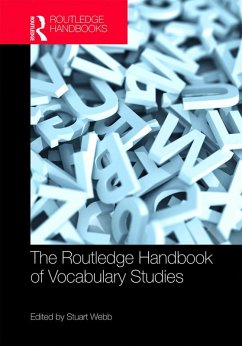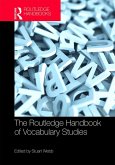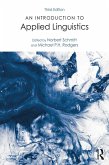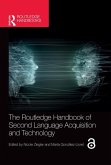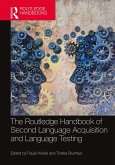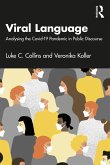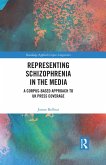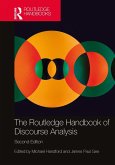The Routledge Handbook of Vocabulary Studies (eBook, ePUB)
Redaktion: Webb, Stuart
47,95 €
47,95 €
inkl. MwSt.
Sofort per Download lieferbar

24 °P sammeln
47,95 €
Als Download kaufen

47,95 €
inkl. MwSt.
Sofort per Download lieferbar

24 °P sammeln
Jetzt verschenken
Alle Infos zum eBook verschenken
47,95 €
inkl. MwSt.
Sofort per Download lieferbar
Alle Infos zum eBook verschenken

24 °P sammeln
The Routledge Handbook of Vocabulary Studies (eBook, ePUB)
Redaktion: Webb, Stuart
- Format: ePub
- Merkliste
- Auf die Merkliste
- Bewerten Bewerten
- Teilen
- Produkt teilen
- Produkterinnerung
- Produkterinnerung

Bitte loggen Sie sich zunächst in Ihr Kundenkonto ein oder registrieren Sie sich bei
bücher.de, um das eBook-Abo tolino select nutzen zu können.
Hier können Sie sich einloggen
Hier können Sie sich einloggen
Sie sind bereits eingeloggt. Klicken Sie auf 2. tolino select Abo, um fortzufahren.

Bitte loggen Sie sich zunächst in Ihr Kundenkonto ein oder registrieren Sie sich bei bücher.de, um das eBook-Abo tolino select nutzen zu können.
This handbook provides a cutting-edge survey of current scholarship in this area. Featuring original contributions from an international range of renowned scholars as well as academics at the forefront of innovative research, this is an essential text for those interested in teaching, learning, and researching vocabulary.
- Geräte: eReader
- ohne Kopierschutz
- eBook Hilfe
- Größe: 196.06MB
Andere Kunden interessierten sich auch für
![The Routledge Handbook of Vocabulary Studies (eBook, PDF) The Routledge Handbook of Vocabulary Studies (eBook, PDF)]() The Routledge Handbook of Vocabulary Studies (eBook, PDF)47,95 €
The Routledge Handbook of Vocabulary Studies (eBook, PDF)47,95 €![An Introduction to Applied Linguistics (eBook, ePUB) An Introduction to Applied Linguistics (eBook, ePUB)]() An Introduction to Applied Linguistics (eBook, ePUB)42,95 €
An Introduction to Applied Linguistics (eBook, ePUB)42,95 €![The Routledge Handbook of Second Language Acquisition and Technology (eBook, ePUB) The Routledge Handbook of Second Language Acquisition and Technology (eBook, ePUB)]() The Routledge Handbook of Second Language Acquisition and Technology (eBook, ePUB)47,95 €
The Routledge Handbook of Second Language Acquisition and Technology (eBook, ePUB)47,95 €![The Routledge Handbook of Second Language Acquisition and Language Testing (eBook, ePUB) The Routledge Handbook of Second Language Acquisition and Language Testing (eBook, ePUB)]() The Routledge Handbook of Second Language Acquisition and Language Testing (eBook, ePUB)47,95 €
The Routledge Handbook of Second Language Acquisition and Language Testing (eBook, ePUB)47,95 €![Viral Language (eBook, ePUB) Viral Language (eBook, ePUB)]() Luke C. CollinsViral Language (eBook, ePUB)42,95 €
Luke C. CollinsViral Language (eBook, ePUB)42,95 €![Representing Schizophrenia in the Media (eBook, ePUB) Representing Schizophrenia in the Media (eBook, ePUB)]() James BalfourRepresenting Schizophrenia in the Media (eBook, ePUB)42,95 €
James BalfourRepresenting Schizophrenia in the Media (eBook, ePUB)42,95 €![The Routledge Handbook of Discourse Analysis (eBook, ePUB) The Routledge Handbook of Discourse Analysis (eBook, ePUB)]() The Routledge Handbook of Discourse Analysis (eBook, ePUB)46,95 €
The Routledge Handbook of Discourse Analysis (eBook, ePUB)46,95 €-
-
-
This handbook provides a cutting-edge survey of current scholarship in this area. Featuring original contributions from an international range of renowned scholars as well as academics at the forefront of innovative research, this is an essential text for those interested in teaching, learning, and researching vocabulary.
Dieser Download kann aus rechtlichen Gründen nur mit Rechnungsadresse in A, B, BG, CY, CZ, D, DK, EW, E, FIN, F, GR, HR, H, IRL, I, LT, L, LR, M, NL, PL, P, R, S, SLO, SK ausgeliefert werden.
Produktdetails
- Produktdetails
- Verlag: Taylor & Francis eBooks
- Seitenzahl: 618
- Erscheinungstermin: 30. Juli 2019
- Englisch
- ISBN-13: 9781000012385
- Artikelnr.: 68422281
- Verlag: Taylor & Francis eBooks
- Seitenzahl: 618
- Erscheinungstermin: 30. Juli 2019
- Englisch
- ISBN-13: 9781000012385
- Artikelnr.: 68422281
- Herstellerkennzeichnung Die Herstellerinformationen sind derzeit nicht verfügbar.
Stuart Webb is Professor of Applied Linguistics at the University of Western Ontario, Canada. His research interests include vocabulary studies, extensive reading and listening, and language learning through watching television.
List of figures
List of tables
List of contributors
Acknowledgements
1 Introduction
Part I UNDERSTANDING VOCABULARY
2 The different aspects of vocabulary knowledge
3 Classifying and identifying formulaic language
4 An overview of conceptual models and thories of lexical representation in
the mental lexicon
5 The relationship between vocabulary knowledge and language proficiency
6 Frequency as a guide for vocabulary usefulness: High-, mid- and
low-frequency words
7 Academic vocabulary
8 Technical vocabulary
9 Factors affecting the learning of single word items
10 Factors affecting the learning of multiword items
11 Learning single words vs. multiword items
12 Processing single- and multi-word items
13 L1 and L2 vocabulary size and growth
14 How does vocabulary fit into theories of second language learning?
Part ¿ APPROACHES TO TEACHING AND LEARNING VOCABULARY
15 Incidental vocabulary learning
16 Intentional L2 vocabulary learning
17 Approaches to learning vocabulary inside the classroom
18 Strategies for learning vocabulary
19 Corpus-based wordlists in second language vocabulary research, learning,
and teaching
20 Learning words with flashcards and wordcards
21 Resources for learning single-word items
22 Resources for learning multi-word items
23 Evaluating exercises for learning vocabulary
Part III MEASURING KNOWLEDGE OF VOCABULARY
24 Measuring depth of vocabulary knowledge
25 Measuring knowledge of multiword items
26 Measuring vocabulary learning progress
27 Measuring the ability to learn words
28 Sensitive measures of vocabulary knowledge and processing: Expanding
Nation's framework
29 Measuring lexical richness
Part IV KEY ISSUES IN TEACHING, RESEARCHING, AND MEASURING VOCABULARY
30 Key issues in teaching single word items
31 Key issues in teaching multiword items
32 Single, but not unrelated: Key issues in teaching single word items
33 Key issues in researching multiword items
34 Key issues in measuring vocabulary knowledge
35 Resources for researching vocabulary
Index
List of tables
List of contributors
Acknowledgements
1 Introduction
Part I UNDERSTANDING VOCABULARY
2 The different aspects of vocabulary knowledge
3 Classifying and identifying formulaic language
4 An overview of conceptual models and thories of lexical representation in
the mental lexicon
5 The relationship between vocabulary knowledge and language proficiency
6 Frequency as a guide for vocabulary usefulness: High-, mid- and
low-frequency words
7 Academic vocabulary
8 Technical vocabulary
9 Factors affecting the learning of single word items
10 Factors affecting the learning of multiword items
11 Learning single words vs. multiword items
12 Processing single- and multi-word items
13 L1 and L2 vocabulary size and growth
14 How does vocabulary fit into theories of second language learning?
Part ¿ APPROACHES TO TEACHING AND LEARNING VOCABULARY
15 Incidental vocabulary learning
16 Intentional L2 vocabulary learning
17 Approaches to learning vocabulary inside the classroom
18 Strategies for learning vocabulary
19 Corpus-based wordlists in second language vocabulary research, learning,
and teaching
20 Learning words with flashcards and wordcards
21 Resources for learning single-word items
22 Resources for learning multi-word items
23 Evaluating exercises for learning vocabulary
Part III MEASURING KNOWLEDGE OF VOCABULARY
24 Measuring depth of vocabulary knowledge
25 Measuring knowledge of multiword items
26 Measuring vocabulary learning progress
27 Measuring the ability to learn words
28 Sensitive measures of vocabulary knowledge and processing: Expanding
Nation's framework
29 Measuring lexical richness
Part IV KEY ISSUES IN TEACHING, RESEARCHING, AND MEASURING VOCABULARY
30 Key issues in teaching single word items
31 Key issues in teaching multiword items
32 Single, but not unrelated: Key issues in teaching single word items
33 Key issues in researching multiword items
34 Key issues in measuring vocabulary knowledge
35 Resources for researching vocabulary
Index
List of figures
List of tables
List of contributors
Acknowledgements
1 Introduction
Part I UNDERSTANDING VOCABULARY
2 The different aspects of vocabulary knowledge
3 Classifying and identifying formulaic language
4 An overview of conceptual models and thories of lexical representation in
the mental lexicon
5 The relationship between vocabulary knowledge and language proficiency
6 Frequency as a guide for vocabulary usefulness: High-, mid- and
low-frequency words
7 Academic vocabulary
8 Technical vocabulary
9 Factors affecting the learning of single word items
10 Factors affecting the learning of multiword items
11 Learning single words vs. multiword items
12 Processing single- and multi-word items
13 L1 and L2 vocabulary size and growth
14 How does vocabulary fit into theories of second language learning?
Part ¿ APPROACHES TO TEACHING AND LEARNING VOCABULARY
15 Incidental vocabulary learning
16 Intentional L2 vocabulary learning
17 Approaches to learning vocabulary inside the classroom
18 Strategies for learning vocabulary
19 Corpus-based wordlists in second language vocabulary research, learning,
and teaching
20 Learning words with flashcards and wordcards
21 Resources for learning single-word items
22 Resources for learning multi-word items
23 Evaluating exercises for learning vocabulary
Part III MEASURING KNOWLEDGE OF VOCABULARY
24 Measuring depth of vocabulary knowledge
25 Measuring knowledge of multiword items
26 Measuring vocabulary learning progress
27 Measuring the ability to learn words
28 Sensitive measures of vocabulary knowledge and processing: Expanding
Nation's framework
29 Measuring lexical richness
Part IV KEY ISSUES IN TEACHING, RESEARCHING, AND MEASURING VOCABULARY
30 Key issues in teaching single word items
31 Key issues in teaching multiword items
32 Single, but not unrelated: Key issues in teaching single word items
33 Key issues in researching multiword items
34 Key issues in measuring vocabulary knowledge
35 Resources for researching vocabulary
Index
List of tables
List of contributors
Acknowledgements
1 Introduction
Part I UNDERSTANDING VOCABULARY
2 The different aspects of vocabulary knowledge
3 Classifying and identifying formulaic language
4 An overview of conceptual models and thories of lexical representation in
the mental lexicon
5 The relationship between vocabulary knowledge and language proficiency
6 Frequency as a guide for vocabulary usefulness: High-, mid- and
low-frequency words
7 Academic vocabulary
8 Technical vocabulary
9 Factors affecting the learning of single word items
10 Factors affecting the learning of multiword items
11 Learning single words vs. multiword items
12 Processing single- and multi-word items
13 L1 and L2 vocabulary size and growth
14 How does vocabulary fit into theories of second language learning?
Part ¿ APPROACHES TO TEACHING AND LEARNING VOCABULARY
15 Incidental vocabulary learning
16 Intentional L2 vocabulary learning
17 Approaches to learning vocabulary inside the classroom
18 Strategies for learning vocabulary
19 Corpus-based wordlists in second language vocabulary research, learning,
and teaching
20 Learning words with flashcards and wordcards
21 Resources for learning single-word items
22 Resources for learning multi-word items
23 Evaluating exercises for learning vocabulary
Part III MEASURING KNOWLEDGE OF VOCABULARY
24 Measuring depth of vocabulary knowledge
25 Measuring knowledge of multiword items
26 Measuring vocabulary learning progress
27 Measuring the ability to learn words
28 Sensitive measures of vocabulary knowledge and processing: Expanding
Nation's framework
29 Measuring lexical richness
Part IV KEY ISSUES IN TEACHING, RESEARCHING, AND MEASURING VOCABULARY
30 Key issues in teaching single word items
31 Key issues in teaching multiword items
32 Single, but not unrelated: Key issues in teaching single word items
33 Key issues in researching multiword items
34 Key issues in measuring vocabulary knowledge
35 Resources for researching vocabulary
Index
